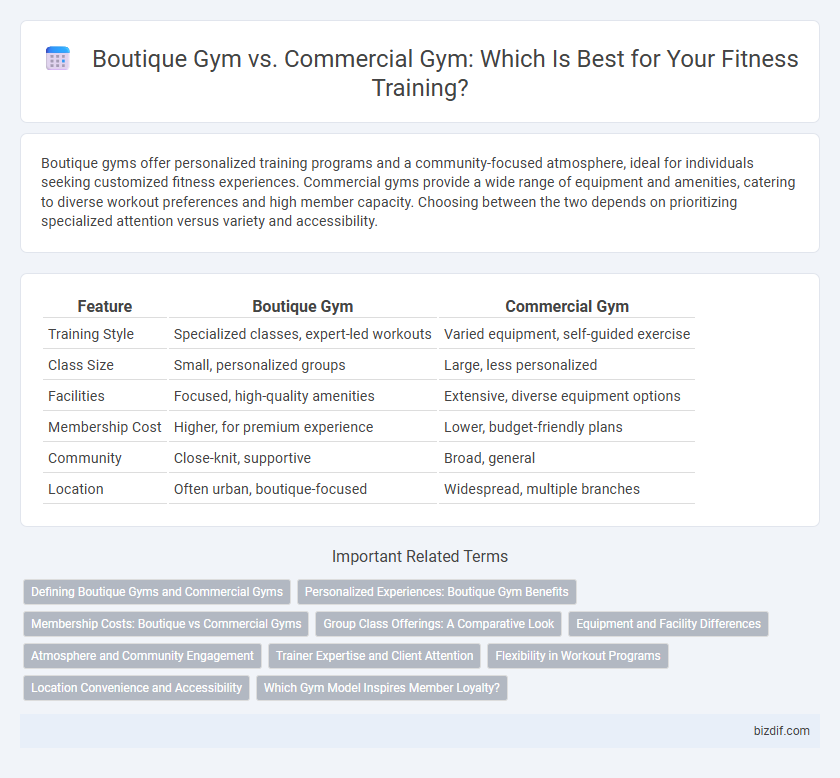Boutique gyms offer personalized training programs and a community-focused atmosphere, ideal for individuals seeking customized fitness experiences. Commercial gyms provide a wide range of equipment and amenities, catering to diverse workout preferences and high member capacity. Choosing between the two depends on prioritizing specialized attention versus variety and accessibility.
Table of Comparison
| Feature | Boutique Gym | Commercial Gym |
|---|---|---|
| Training Style | Specialized classes, expert-led workouts | Varied equipment, self-guided exercise |
| Class Size | Small, personalized groups | Large, less personalized |
| Facilities | Focused, high-quality amenities | Extensive, diverse equipment options |
| Membership Cost | Higher, for premium experience | Lower, budget-friendly plans |
| Community | Close-knit, supportive | Broad, general |
| Location | Often urban, boutique-focused | Widespread, multiple branches |
Defining Boutique Gyms and Commercial Gyms
Boutique gyms are small, specialized fitness centers offering personalized training, group classes, and a community-driven atmosphere, often focusing on specific workout styles like yoga, Pilates, or high-intensity interval training (HIIT). Commercial gyms are larger facilities with extensive equipment, diverse fitness options, and amenities such as swimming pools and basketball courts, designed to accommodate a broad clientele. Boutique gyms emphasize quality and tailored experiences, while commercial gyms prioritize variety and accessibility.
Personalized Experiences: Boutique Gym Benefits
Boutique gyms offer highly personalized experiences by providing tailored workout plans and one-on-one coaching, which significantly enhance fitness progress. These gyms typically feature smaller class sizes and specialized equipment, allowing trainers to focus on individual client needs and goals. Members benefit from a supportive community atmosphere that fosters motivation and accountability, leading to improved overall fitness outcomes.
Membership Costs: Boutique vs Commercial Gyms
Membership costs at boutique gyms typically range from $100 to $300 per month, reflecting their specialized classes, personalized training, and exclusive facilities. In contrast, commercial gyms offer more affordable membership options, often between $20 and $50 monthly, catering to a broader audience with access to basic equipment and group classes. The higher price point of boutique gyms corresponds to a tailored fitness experience and smaller class sizes, while commercial gyms prioritize cost-efficiency and accessibility.
Group Class Offerings: A Comparative Look
Boutique gyms specialize in curated group class offerings such as yoga, pilates, and high-intensity interval training (HIIT), providing personalized coaching and a tight-knit community atmosphere. Commercial gyms typically offer a broader variety of group classes, including spinning, Zumba, and body pump, catering to a diverse clientele with varying fitness levels. The quality of instruction and class size often distinguish boutique gyms as ideal for focused, specialized workouts, while commercial gyms prioritize availability and convenience.
Equipment and Facility Differences
Boutique gyms typically offer specialized, high-quality equipment designed for niche fitness programs such as functional training, HIIT, or yoga, ensuring a focused workout experience. Commercial gyms provide a broader range of equipment including extensive cardio machines, resistance training machines, and free weights, catering to diverse workout preferences and larger member volumes. Facilities in boutique gyms emphasize personalized, intimate settings with limited capacity, while commercial gyms feature expansive spaces with multiple workout zones and amenities like pools and sports courts.
Atmosphere and Community Engagement
Boutique gyms offer a personalized atmosphere with specialized classes that foster a tight-knit community, promoting motivation and accountability among members. Commercial gyms provide a larger, more impersonal environment with high member turnover, where community engagement tends to be limited by the focus on extensive equipment and amenities. Members at boutique gyms often experience stronger social connections and targeted support, enhancing overall fitness commitment and satisfaction.
Trainer Expertise and Client Attention
Boutique gyms offer specialized trainer expertise with personalized attention tailored to individual fitness goals, ensuring customized workout plans and closer monitoring of progress. Commercial gyms tend to have a larger staff but may lack the focused trainer-client interaction, often providing more generalized guidance suited for mass clientele. Clients seeking targeted coaching and motivated support typically benefit more from boutique gym environments where trainer expertise is concentrated and client engagement is prioritized.
Flexibility in Workout Programs
Boutique gyms offer highly flexible workout programs tailored to individual goals and preferences, often featuring specialized classes such as yoga, Pilates, or HIIT that can adapt to varying skill levels. Commercial gyms typically provide a broader range of equipment and generalized workout options but may lack the personalized flexibility found in boutique settings. Members seeking customized training schedules and focus areas often prefer boutique gyms for their ability to accommodate diverse fitness needs.
Location Convenience and Accessibility
Boutique gyms often prioritize prime urban locations, providing easy access for city dwellers and professionals seeking convenience near work or home. Commercial gyms typically offer numerous branches with extended hours and ample parking, catering to a broader demographic including suburban members. Location convenience and accessibility significantly influence member retention and workout frequency in both gym types.
Which Gym Model Inspires Member Loyalty?
Boutique gyms foster member loyalty through personalized training programs, expert coaching, and a tight-knit community atmosphere fostering motivation and accountability. Commercial gyms offer extensive equipment and flexible hours but often lack the individualized attention that drives consistent engagement. Members tend to stay longer at boutique gyms due to specialized services and a supportive environment tailored to their fitness goals.
Boutique gym vs Commercial gym Infographic

 bizdif.com
bizdif.com